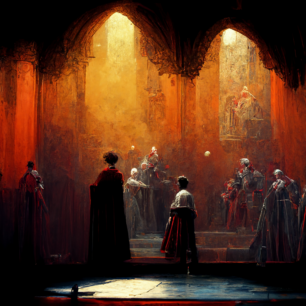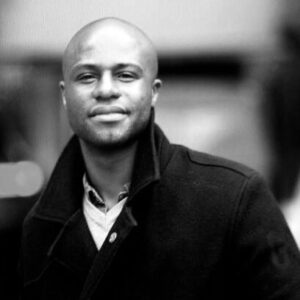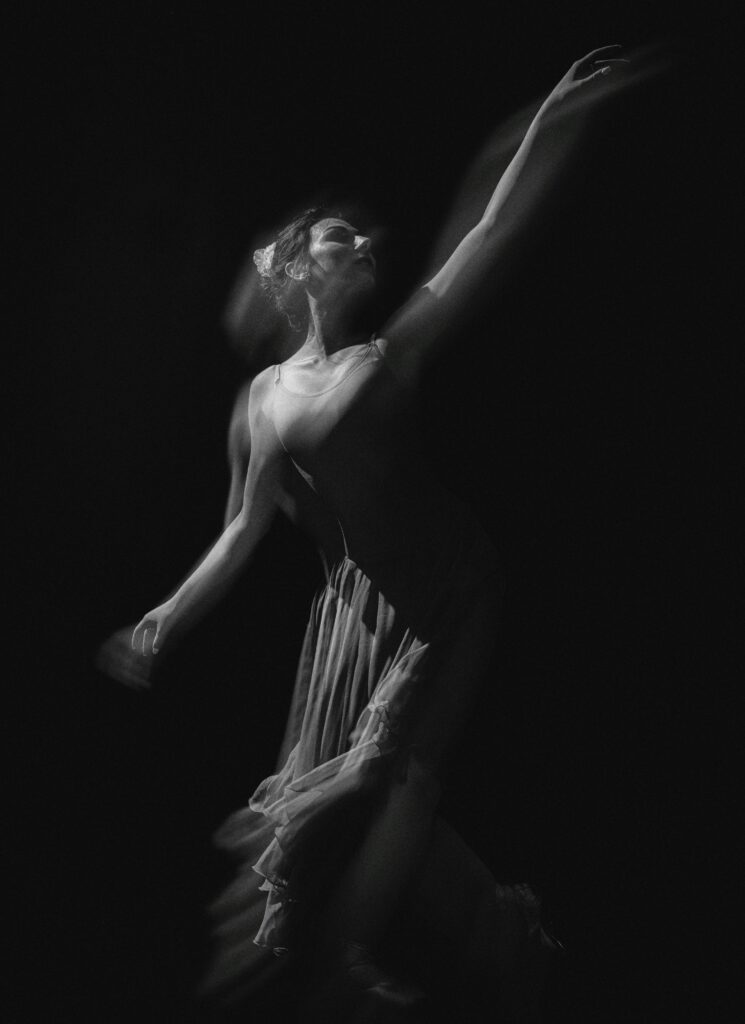YEAR OF THE PRINCE
Eric Akoto, December 9, 2022
It is the most shattering experience of a young man’s life when he awakes and quite reasonably says to himself: [He puts his hand on his heart] I will never play The Dane. When that moment comes, one’s ambition ceases. Don’t you agree?
– Withnail and I (1987)
Back from watching a piece of new writing in the London Fringe, but all I can think about is I’ve been asked to play Hamlet.
Hamlet, Hamlet, Hamlet.
I remember watching Mel Gibson’s cut-to-shreds Hamlet, with Dad. I must have been 14 or 15, studying Macbeth in school and finding Shakespeare dull. I really hated studying King Lear at 17.
Then after playing Ariel in The Tempest, my first experience of acting Shakespeare, it was like light shone down, and I have never had a problem understanding Shakespeare since.
Branagh’s Hamlet came out while I was in university, and I yearned, burned to be in it. It was beautiful, and he’d used the text in its entirety, every word, all four hours of it.
Then watching my first fringe production – in a dark basement in King’s X, produced by the lead, and it all seeming very formal, egotistical, and cack-handed – an ego-project, the kind of thing that now makes my stomach churn.
Then Sam West’s Hamlet, the first professional production I’d seen, full of clapping and moving security cameras on the proscenium arch, the over-seeing of the court played strong.
And Jude Law’s a couple of years ago, which looked stunning but I remember thinking “They’re saying all these beautiful words, but some of the actors don’t seem to know what any of them mean…”
And then the great ones I missed: Daniel Day Lewis so in character he walked off stage never to return, having hallucinated the ghost of his own dead father. Or Mark Rylance in pyjamas at the RSC, and then his second go at the Globe which I did catch, so beautifully simple, playful, wonderful.
This can’t be an ego project. I can’t be a big fish in a small pool, with every word dropping from my lips taken as gold because of my other work in Shakespeare. [private]
***
Hamlet.
Hamlet, Hamlet, Hamlet. The thing about Hamlet, about all of Shakespeare’s parts, is he gives you the most beautiful, ornate frame, and a blank canvas. You can paint whatever picture you want of the character. It is half Shakespeare, half you. Shakespeare drops the golden bread-crumbs, leading you towards the truth, but it’s still you walking the walk.
And the play has SO many questions. Is he mad? Does he love Ophelia?
What is the truth, the reason behind saying these famous words, To be, or not to be… what kind of person needs to speak them aloud…?
I wrote this a few years ago:
Hamlet is considered to be the most sought-after and the most elusive role for actors, and the play remains the most produced of Shakespeare’s works; countless productions, interpretations and re-interpretations have been dreamt up, trying to nail down The Definitive Hamlet.
When I wrote that, I remember thinking: but I don’t particularly want to play it…
***
Over Skype, my friend Will (a member of my ensemble who learnt all of Shakespeare’s Sonnets off by heart) and I talk about learning all those lines.
Shakespeare’s actors had prodigious memories, despite the booze: both because their culture was filled with more storytelling than ours, and their brains had less input than ours do – no synapse-creating Internet, movies, or adverts. They were the only ones intended to read Shakespeare’s plays – 80% of the people in his time being illiterate – and even they would rarely have read the entire play.
Apparently, there was no scribe/scrivener/copyist on Henslowe’s payroll. We talked tonight about whether they would have copied out their own lines, a centuries old theatrical tradition that was still practiced in the Rep system, and a great aide-memoir. It means Shakespeare’s actors were probably all literate. It’s possible they had their lines written out, or read out to them, but it’s unlikely – paying for scribes would mean wasted time and unnecessary cost.
So they would have written out only their parts – what is the point, if you play Laertes, to write out the middle of the play? What, indeed, is the point in writing out the lines of the other characters in a scene, if you only say one thing at the very end before everyone leaves? It’s a waste of paper (expensive), ink (ibid), and time-consuming (not useful when the play opens in a few days). Better to write out your part and your cue to speak, so you knew when to speak.
And you’d have even less time if you were playing a smaller part, as the full script would be passed to the lead actors first, and they take soooo much time to copy their parts out. So your cue-script, your part, is your entire knowledge of the play until you walk on stage and hear it for the first time.
Some say the first time some of Shakespeare’s actors would have heard the play in its entirety was at the same time as the first audience, and there’s a few companies (my own included) that use this cue-script practice.
It makes for very very live Shakespeare in comparison to the standard, heavily-rehearsed modern productions, where one of the skills you have to develop is not looking or sounding disinterested having heard the lines dozens of times before.
***
Amsterdam, to run a workshop for Will at a high-school in deepest south Holland. Workshops go well, but I keep thinking about Hamlet…
Re-reading it on the train. If I’m going to do this, the first thing I need to do is work out the biggest mountain first: what is To be or not to be about?
Some people say that if an actor is revealing something about themselves and not the character, then they’re not doing it right, but everything I know about Shakespeare is to the contrary. The frame and the canvas. The frame is the verse, and you bring your self, as openly and vulnerably as possible into the brush, when you paint the rest.
Hamlet is more human, more intelligent, more passionate, MORE, than any other character I’ve encountered.
***
Coffee with Hilton McRae. I understudied his Feste in a National Tour of Twelfth Night, the producer Thelma Holt having given me my first professional Shakespeare gig. I was a slightly glorified spear-carrier, Orsino’s man, with Fabian’s letter-reading speech at the end. I met him at the read-through, and said:
– Hi, I’m understudying you.
And Hilt said:
H – Oh god, you poor thing.
And walked away.
But the job was a start, and I enjoyed the craft of trying to bring a real, subtle life to an unimportant character. I invented enough stage-business with files and folders to try and help create the world of Orsino’s court, without turning it into Twelfth Night or The Plight of Orsino’s Man.
I enjoyed the freedom of Feste, as he flew around the stage, slid on the floor up to his Lady Olivia, and as the Clown, had free license to do pretty much anything. The way he moved, I realise now, formed the way my Hamlet moved…
My opening line in the play, after Orsino’s famous “If music be the food of love, play on,” was the nearly-as-immortal line “Will you go hunt, my Lord?”, delivered by yours truly.
I agonised over how to deliver that line:
1. Frustration: WILL you go hunt my Lord? (probably inappropriate to be frustrated)
2. Pointed: Will YOU go hunt my Lord? (as opposed to who?)
3. Strong: Will you GO hunt my Lord? (by himself? like telling a child to go play? really inappropriate)
4. I’ve got an idea: Will you go HUNT my Lord? (as opposed to? moping around wishing for Olivia – not bad)
5. Possessive: Will you go hunt MY Lord? showing allegiance: but, a bit much. And, the play is also not called Twelfth Night or Orsino’s Man’s Love for Orsino)
6. Will you go hunt my LORD? (instead of calling him Orsi?)
Eventually, I asked Hilton for advice in the car-park of the Plymouth Theatre Royal, a few days before we opened.
We’d broken for lunch, and I was glum. Even though I had almost nothing to do, the director wouldn’t release me during the next day’s tech run, for a big film audition in London. That’s the problem with actors. We’ve barely started the first job before we’re looking ahead to the next. And we’re already spending the money before we get there.
Hilton stared down at the floor, then squinted up at me.
H – Well, it’s a question, isn’t it?
– Yeah.
H – So… ask the question. Will you go hunt my Lord? Just ask the question.
Hilton lit his licorice rollie, and walked away, as I stared at the space where he was, slack-jawed.
Best acting lesson I’ve ever learnt. The simplicity. That’s the problem with Shakespeare. Because it’s SHAKESPEARE and it’s LITERATURE, and it’s written in IAMBIC PENTAMETER and it’s POETRY, and can be tricky to understand, it’s easy to lose yourself in a maze of over-analysis.
“Just ask the question.” A note I pin to the inside of my head whenever I realise I’m working it too hard.
Hilton has a reputation for being difficult, but he’s not. He just won’t put up with ANY bullshit, WHATSOEVER. And he’s a great believer in how much information is packed into the text and the metre. This means his acting is terrifically truthful, and solidly based. He chases down the life of a character like a Hound.
I tell him about my concerns about playing the Dane, about what to do with the big speeches. Hilt squints at me, in the warm morning sunlight of Primrose Hill. Then in his lackadaisical Scottish drawl:
H – Thingabout playing Hamlet is, it’s not about the bits you normally get to do. It’s about the other bits, the small bits you never get to say…
The great Sir John Gielgud floats to mind. His first gig was as a spear-carrier in a 1921 production of Henry V. Eight years later he performed what people have been saying since was the greatest Hamlet ever. He then played it something like 4 times more, his final at 45.
His style of acting – and speaking Shakespeare – went out of fashion in the 50s with the arrival of Laurence Olivier, the Royal Court, and John Osborne’s Look Back in Anger. After that, audiences wanted less musical-poetic, more kitchen-sink, real Shakespeare, of which I am a disciple…
But looking back to Branagh’s Hamlet, which at the time seemed so ground-breaking, it now feels grand. Rather than people speaking poetry, the question is why do the characters feel there is no other way to express what they’re feeling or thinking than in poetry?
***
At the Hay-on-Wye Literature Festival, giving a talk with Don Paterson.
In the Green Room, I meet the great Shakespeare actor Simon Russell-Beale. I tell him I’m about to play Hamlet, and he goes quiet for a moment, before looking me solidly in the eyes.
SRB – Enjoy it. Give it everything you have. And I’ll tell you what they told me: It will change your life.
– How?
He sits back, unblinking.
SRB – It will change you, he repeats.
I sit backstage listening to him and the Archbishop of Canterbury discuss all things Shakespearean, when suddenly he mentions Hamlet and its awe-inspiring hugeness and he name-checks me, as one who was about to undertake this magnificent part, and he wishes me well, and then I’m staring into space and I walk in on myself: it’s actually going to happen.
***
Before I leave for rehearsals. Possibly driving everyone crazy talking about Hamlet.
Everywhere I go recently, people seem to have others close to them who are dying, or have been close to death. I keep talking about it, because I have these flashes, these moments of panic when I’m really tired or hungover. It’s not natural to always be thinking of your own mortality. In order to understand Hamlet, I need to get my head into his head. Which makes me reflect on my own.
A scientist at the Hay Festival last week said “the people who will be watching our own sun, which is 4 billion years old, burn out in 6 billion years time, will be as different to us as we are from amoeba.”
Humans generally tend to be uncomfortable with the idea of their own mortality, and seek solace in religion, or “something greater”. But Hamlet doesn’t. He thinks “the rest is silence.”
It’s a concept, like trying to conceive of the size of the universe and the things going on around us every day, while worrying about an unsent email. Our minds aren’t built to cope with the macro all the time. And yet I’m facing it more often than I ever used to.
***
I start every day of rehearsals with stick w
ork I’ve adapted from Complicité workshops. Stand on one side of the room. Balance a bamboo stick (about 1.5 metres long) on the tip of your finger. Walk across the space. And that’s it. Just take a stick for a walk, without imposing any play or character on it. But when it falls, and fall it must, catch it as if it’s the love of your life falling into your arms.
It’s a beautifully simple, endlessly fascinating exercise. It allows practice in one’s own physicality, and once a certain level of simplicity has been achieved, walking the stick in character, or with another actor who’s also in character, can make for powerful physical exploration. Watching my company members reach into the emotional core of the play, and someone different every day falls apart, surprised at their sudden tears. There should be a warning on the back of this script.
It’s like this play, more than any other, was once a novel, and all the moments, interaction, speech has been boiled down to the bare essentials, that we’re left with the essence of what they’re talking about.
We spend our lives in bubble wrap, trying not to get hurt. It’s good to feel pain, and ache, both in body and heart. It reminds us we’re feeling, sentient beings, that are so good at masking the experience and extremities of life – we have to tear past that screen, in order to be free, open and vulnerable; to begin work.
One of the exercises I run pushes my actors to face the emotional heart of a text. Once achieved, they can revisit their memory of the high stakes/emotional depths, so in the moment of encountering a similarly high emotion in the text, the chord has already been struck and the note is still ringing in their ears. When it strikes again they’ll remember the experience from today, and with practice find it easier to reach.
The process made them see that there’s a blueprint there, written in, and that they don’t have to do anything other than just be honest, truthful, and direct.
***
…haven’t written a thing in a few days…
…first day off since we opened. let the bruises (like apples on my left hip and lower left knee – I still haven’t worked out where in the show i keep landing badly) heal, my voice recover from this cold, and shrug off a little bit of fatigue, thanks to the opening night party on Friday…
…an amazing show with a nearly full audience… ELECTRIC to have such a crowd to talk to, to relate to, my friend, as Shakespeare’s monologues were meant to be, not introspective, but live and immediate questions or reflections to and with the Other person in the room: the audience…
…must remember that more. i love the argument in the relationship w the audience in Rogue, the terrible things said in the heat of an argument with a loved one, like Ophelia and I playing ‘I loved you not/i was the more deceived’ in the nunnery scene… the move from humour to explosive anger to self-awareness to apology with explanation in O what a rogue and peasant slave am I… – giving the audience a treat from the clever guy, as he explains what he’s going to do, and the vulnerability when he tells them why he’s going to do it, that he’s afraid…
…the apology, and explanation for getting upset, the trying to calm the angered lover with I have heard guilty creatures… onwards meets with resistance. then the admittance of guilt, to lack of action, and the explanation for that lack of action…
…the scared self-awareness in Now is the verie witching time, and the vile, menacing hatred in Now might i do it…
…the Samaritan call in Too too solid flesh. the knowledge of Now might I do it, but have I been to arrogant with that? am I too knowing? should the action be different? smugness is not attractive in a friend. but to me it makes most sense. answering their question “why don’t you kill him now?”
…the final desperate words to them, You that look pale and tremble at this chance, That are but mutes or audience to this act Had I but time… O, I could tell you. But let it be.
wanting to tell them so much more, everything I never said, that there were hints of in all the speeches…
…this week I think I’ve felt every emotion I have, there’s nothing I haven’t shared, either on stage or off, the only part of me people haven’t shared this week is the porn I look at or checking for zits. oh actually, I think someone saw me today looking at a blocked pore in the dressing room mirror, so I guess it’s just the porn…
i got nothing left.
***
Back in London after three months away on the most extraordinary journey, and to see a production of Hamlet at the Young Vic. They’ve set it in an insane asylum, and despite knowing the play off by heart now, I don’t understand a word. It makes no sense.
This is a bug-bear of mine. There’s been a tendency in recent years for his plays to be ‘concept-driven’, pushing square pegs into a round holes as we try to keep these plays relevant to new generations of theatre-goers – trying to modernise the piece rather than performing it as it was written – and instead of feeling closer to the play, people leave bored or indifferent.
We forget that first and foremost, Shakespeare was an actor. Second, he wrote and acted always and only for the same group of players. They worked together like ants in a hive for over twenty years. As they played together, both actors and writer developed their working relationship into a finely tuned, honed muscle.
If Shakespeare’s actors had their lines in advance, if they came to rehearsal with the words already learnt, lines that had been written to suit their own personal skills, then perhaps they could mount a new play in a few days. Maybe a day…?
What matters are the years and years of experience; working in each other’s pockets, that ensures both repetition and difference. The knowledge and practice that accrue from working in a single company ensure both continuity and innovation. Tremendously intense collaboration between actors and their author.
Russian and Swedish theatre companies spend months, sometimes years working in this way, forming such an ensemble, before beginning more formal rehearsals towards producing a play. With Shakespeare at the heart of our poetic, theatrical and linguistic heritage, perhaps we should do the same
***
Coda
To a pub in Angel for a friend’s friend’s birthday.
Sam West turns up, who I haven’t seen for years. He asks what I’ve been up to.
– I’m just back from playing Hamlet, I say.
His eyes widen, and deepen – a reaction I’ve become used to, from meeting other Hamlets. It’s a look, like people who’ve run a marathon, but without the time competitiveness, or people who have claimed the summit of Everest to see what the view is like. A quiet brotherhood.
Sam and I go out for a cigarette.
S – It changes everything. Your life, your career. I was offered Angelo and I thought, “Well, great. You spend 3 hours on stage as Hamlet. Why would I spend all my time in the dressing room in Measure for Measure?”
Ha. You can understand why Johnny G(ielgud) played it so often.
S – The difference is John never filmed it, and didn’t audio-record it until much later. If you wanted to see him, you had to go. I performed Hamlet 120 times, and a musician friend of mine said to me:
“How can you do that?”
I said, “well, what’s your favourite piece of music?”
“Bach,” she said. “How many times would you like to play it?”
“All my life,” she said.
“Exactly.”
You may also like

Eyes of the Beholden
Unspoken desires linger in the shadows of a teacher's life, revealed through art

LOST
Bessie's odyssey through stormy nights, lost love, and secret graveyards unfolds with haunting beauty in "Lost" by Sandra Dennis.

Water Rising
Amidst a flood, a woman grapples with the past, and confronts the consequences in this haunting narrative of resilience.
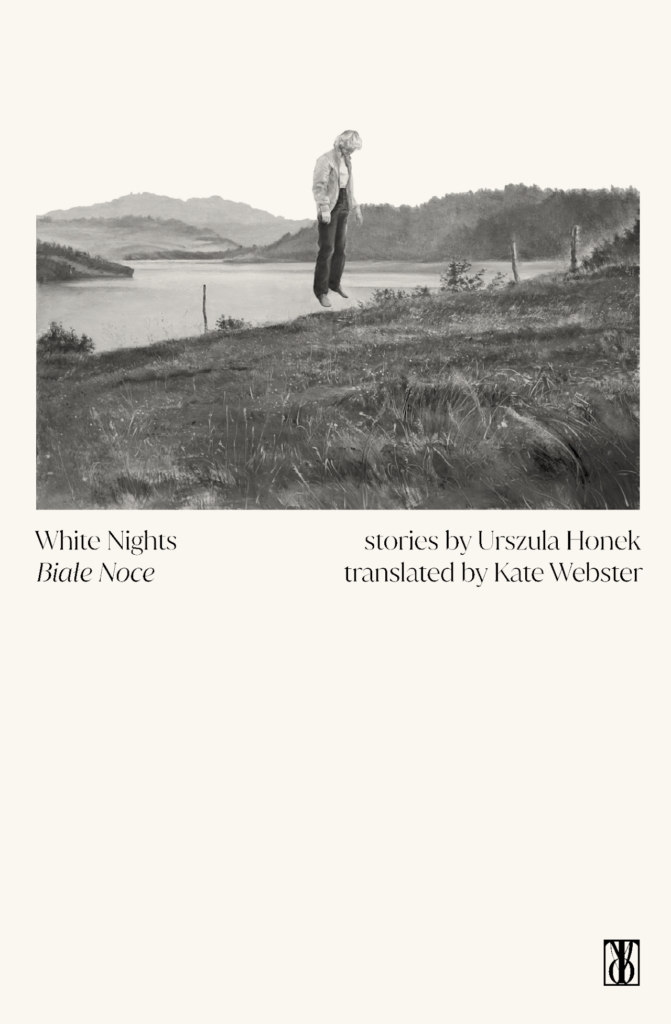
Book Review: White Nights by Urszula Honek
The debut short story from Polish writer Urszula Honek, White Nights, is akin to reading an account of a haunted place – one that is beautiful and devastating in equal
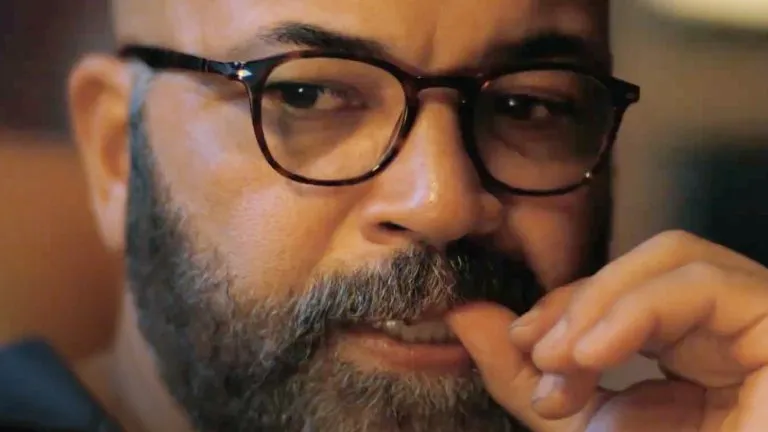
Beyond the Surface: The Multifaceted Lives of ‘American Fiction’
In essence, "American Fiction" and the experiences it draws from remind us that we are indeed more than the sum of our parts.
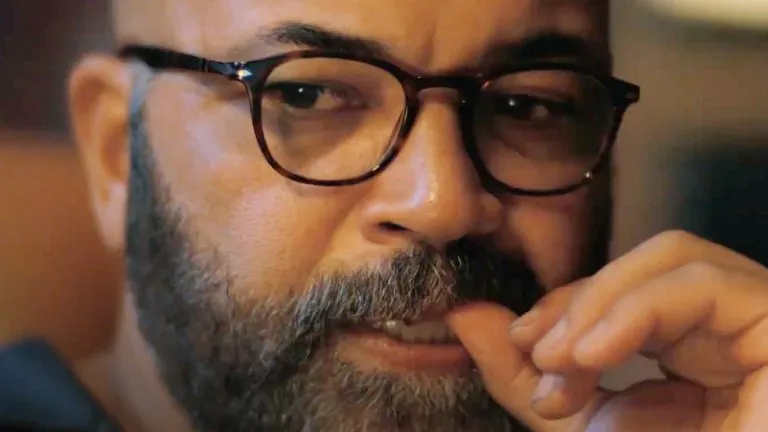
Beyond the Surface: The Multifaceted Lives of ‘American Fiction’
The narrative of “American Fiction” unfolds with a dual focus: it not only scrutinizes the unique pressures faced by Black creatives but also delves into the intricate and sometimes tense…
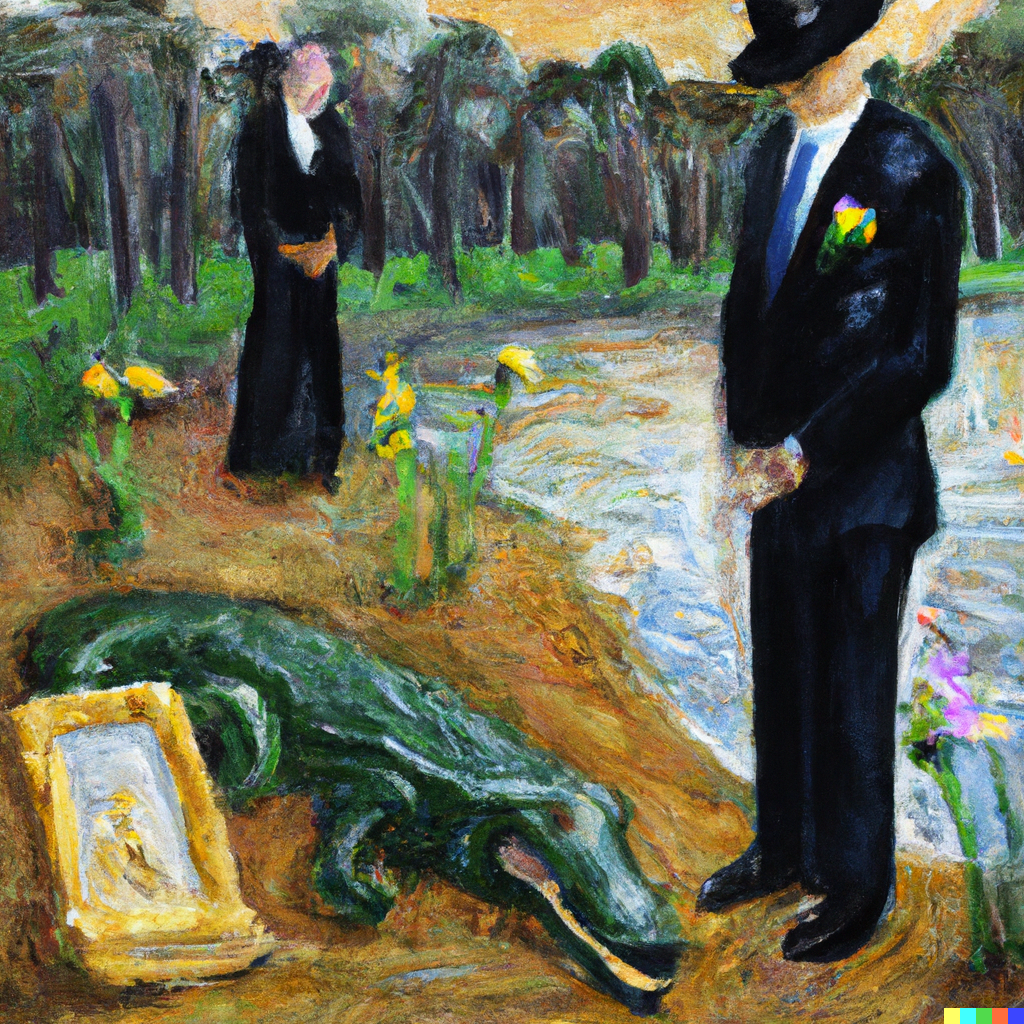
Uncle Bobby’s Funeral
Reluctant family faces the eccentricities of Uncle Bobby's funeral in swampy Chipley.




